- Home
- James Luceno
Star Wars Darth Maul: Saboteur Page 4
Star Wars Darth Maul: Saboteur Read online
Page 4
Because Eriadu was outside the sector—and notwithstanding the fact that they were already receiving payoffs from InterGalactic—the clan had accepted Lommite Limited’s generous offer of Republic credits to perform a bit of sabotage work. InterGalactic would simply have to understand that the nature of their arrangement with the Toom clan had changed. More important, the contract with LL didn’t preclude the possibility of the clan’s entering into a similar contract with InterGal—as certainly might be the case after the Eriadu operation. In fact, the clan had every intention of contacting InterGal to suggest as much.
No one in the clan had expected InterGalactic to contact them before Eriadu.
A leather-faced Weequay, Nort Toom himself accepted the holotransmission from Caba’Zan, head of security for InterGalactic Ore. The clan was mostly made up of far-from-home Weequay and Nikto humanoids, but Aqualish, Abyssin, Barabels, and Gamorreans also numbered among the mix.
“I want to discuss the most recent offer you tendered,” Caba’Zan’s holopresence began. He was a near-human Falleen, burly and green complexioned.
“Our most recent offer,” Nort Toom said carefully.
“About destroying Lommite Limited’s ships at Eriadu.”
Toom’s deep-set eyes darted between the holoprojector and one of his Weequay confederates, who was standing nearby. “Oh, that offer. We have so many operations in the works, it’s sometimes hard to keep track.”
“I’m glad to hear that business is good,” Caba’Zan said disingenuously.
“I’ve a feeling it’s about to get even better.”
The Falleen came directly to the point. “We’re willing to pay one hundred thousand Republic credits.”
Toom tried to keep from celebrating. The offer was twice what Patch Bruit had paid. “You’ll have to go to two hundred thousand.”
Caba’Zan shook his hairless head. “We can go as high as one fifty—if you can guarantee results.”
“Done,” Toom said. “When we see that the credits have been transferred, we’ll make the necessary arrangements.”
Caba’Zan looked dubious. “You’re certain about the reentry coordinates for LL’s ships, and the time of their decanting at Eriadu?”
“Maybe we should go over that one more time,” Toom said.
“You said Rimma 18, at 1300 Eriadu local—unless something has changed.”
“Only for the better,” Toom said reassuringly. “Only for the better.”
“And you’ll make it look like an accident.”
“That’s probably the best way of handling it, don’t you think?”
“We don’t want InterGalactic implicated.”
“We’ll make certain.”
Toom deactivated the holoprojector and sat back, clamping his huge hands behind his head.
“Do you think they know about LL’s hiring us?” his confederate asked in obvious incredulity.
“It didn’t sound that way to me.”
“InterGalactic is offering three times as much as Lommite. Are we going to return Bruit’s money?”
Toom sat forward with determination. “I don’t see any reason for that. We just have to make sure we can execute both contracts.” He grinned broadly. “I have to admit that this appeals to my sense of unfair play.”
“You mean—”
“Exactly. We sabotage everyone’s ships.”
Eriadu was an up-and-coming world in the outlying star systems. Situated close to the intersection of the Rimma Trade Route and the Hydian Way, Eriadu demonstrated a fierce devotion to industry, in the hope of achieving its goal of becoming the most important planet in the sector. To that end Eriadu had even developed a small shipbuilding enterprise, owned and operated by distant cousins of Supreme Chancellor Valorum, who chaired the Galactic Senate on Coruscant.
Eriadu’s orbital facilities paled in comparison to similar ones at Corellia and Kuat, but among the smaller shipyards, Eriadu’s were second only to those at Sluis Van, rimward and just off the principal trade routes.
Eriadu’s lieutenant governor had done much to facilitate the burgeoning partnership between Eriadu and Dorvalla, emphasizing the senselessness of Eriadu’s importing lommite from the Inner Rim when Dorvalla was practically a celestial neighbor. The quantities of ore required by Eriadu Manufacturing and Valorum Shipping were such that neither LL nor InterGal could have filled the orders on their own, but Lieutenant Governor Tarkin saw no dilemma in that. He insisted that he hadn’t set things up as a contest, but there was no denying that it was anything but. Tarkin was even on record as saying that the company awarded the lucrative contract would probably be able to effect a financial takeover of the loser.
Tarkin had arranged for one of Eriadu’s orbital habitats to host a ceremony to endorse the potential partnership, with all the cardinal players present: Jurnel Arrant and his counterpart at InterGalactic, the executive officers of Eriadu Manufacturing and Valorum Shipping, a plethora of business personnel who stood to gain from the new partnership, and, of course, Tarkin himself, representing Eriadu’s political interests.
Sporting the finest in robes and tunics, everyone was gathered on the esplanade level of the orbital facility, awaiting the arrival of the ore barges LL and InterGal had dispatched. The separate flotillas were scheduled to arrive within an hour of each other, local time.
“I’m certain that this will be an auspicious day for all of us,” the lieutenant governor was telling Arrant and the head of Eriadu Manufacturing. Tarkin was a slight man, with a quick mind and an even quicker temper. He stood as rigidly as a military commander, and his blue eyes held neither humor nor empathy.
“Tell me, Arrant,” the manufacturing executive said, “do you foresee a time when Lommite Limited, on its own, could supply enough ore to meet the demands we’re projecting for the near future?”
“Of course,” Arrant answered confidently. “It’s simply a matter of expanding our operations.” He turned and tugged Patch Bruit into the conversation. “Bruit, here, is our field supervisor, among other things. He has just notified me of a rich find, not a hundred kilometers from our present headquarters.”
Bruit nodded. “Our survey teams—” he started to say, when one of LL’s security agents cut him off.
“Chief, I’m sorry to bust in, but we need to talk in private.”
Arrant watched worriedly as Bruit allowed himself to be led away.
“What’s going on?” Bruit demanded when he and the security man were just out of earshot.
“Something has yanked the barges out of hyperspace short of their reentry coordinates. We don’t know the cause. It might be a problem with the hyperspace generators, or maybe an uncharted mass shadow.”
Bruit heard people gasp behind him. When he turned, everyone’s attention was fixed on the huge monitor screens that displayed views of the orbital shipyards. Some distance from the shipyards, and way off course, several lackluster space barges were reverting to realspace.
“Bruit, are those our vessels?” Arrant asked in mounting concern.
“Yes, but there has to be a good reason for their decanting early.”
“This is most unexpected,” Tarkin remarked. “Most unexpected.”
The well-bedecked crowd gasped again. Bruit watched in shock as a second group of ships began to emerge from hyperspace.
“InterGalactic,” his security man said in disbelief.
“They’re going to collide!” someone said.
“Bruit!” Arrant screamed, as the color drained from his face. “Do something!”
What Bruit did was look away.
The screams and cries, the groans and sobs, the strobes of explosive light flashing across the polished floor of the habitat’s esplanade deck told him everything he needed to know. LL’s and InterGal’s barges had been manipulated into mass collisions. Without looking, Bruit could see the lommite ore streaming from fractured hulls, turning local space as white as the molten anger that seethed behind Bruit’s tightly shut eyelids.
“The Toom clan,” he barked to his security man. “They’ve double-crossed us.”
Someone collided with Bruit from behind. It was Jurnel Arrant, backing away from the display screens in numb horror.
“We’re ruined,” he mumbled. “We’re ruined.”
Bruit cleared his head with a shake and clamped his hands on the shoulders of the security man. “Send a message to Caba’Zan at InterGalactic,” he ordered. “Tell him that we need to meet as soon as possible.”
Lovingly crafted, the listening device was a perfect facsimile of a fire flitter. It sat between Bruit and Caba’Zan on a low table in Bruit’s living room, singing its song:
“Here’s the long and short of it. Arrant has decided to move against InterGalactic Ore shipments. No petitioning the senate. He’s letting loose a shooting war. That much has already been decided . . . .”
Caba’Zan ran a hand over his bald pate. “Strange. It almost sounds like your voice.”
Bruit squeezed his eyes shut, then opened them and looked the Falleen in the eye. “That’s because underneath the warping, it is my voice. I spoke those words—most of them anyway—right in this room.”
Caba’Zan’s forehead wrinkled. “I don’t understand.”
“I was briefing my men about the plan for InterGal’s ships at Eriadu. Someone recorded the conversation.”
“One of your men?”
Bruit shook his head in dismay. “I don’t know.”
“One of the Toom clan, then.”
Bruit took his lower lip between his teeth. “Then why the need to warp the recording, and put on a song-and-dance show for your people in the cantina? Besides, there’s no way the Tooms could have gained access to LL’s database and gotten the reentry coordinates for our ships. They’re not that clever. It has to have been one of your men.”
“They’re not that clever,” Caba’Zan said. “Or that industrious. We wouldn’t have known anything about your plans if it wasn’t for the bug.”
Bruit silenced the facsimile flitter and worked his jaw in vexation. “I’ll figure out who it was later on. After I deal with the Toom clan.”
Caba’Zan narrowed his eyes. “They played us both for fools, Bruit. If you’re implying vengeance, I want some of the action.”
Secreted beneath the stilted dwelling, Darth Maul smiled to himself, dropped to the ground, and hurried into the darkness.
Maul never doubted that the Toom clan would enter into contracts with both mining companies. Nor did he think that the clan would fail to deliver on its promise to sabotage the ships. Thus he had had no need to go to Eriadu to witness the fatal collisions. Instead he had passed the time watching members of the Toom clan shut down and abandon the base on Dorvalla. Surmising correctly that their betrayal would unite LL and InterGal against them—even briefly—the mercenaries had decided to abscond while they could.
Maul had trailed them to Riome, a small, ice-covered world deeper in the Dorvalla system, where the clan already had established a secret base.
A more astute group of outlaws might have elected to put as much distance as possible between themselves and Dorvalla. But perhaps the Toom clan was convinced that even the combined security forces of Lommite Limited and InterGalactic Ore wouldn’t be a match for them. Whichever, Maul’s next task was to make certain that Bruit learned the location of the Riome sanctuary by planting evidence at the site of the clan’s former base.
Maul spent a full day in frigid temperatures and howling winds, waiting for Bruit and his men to arrive. Armed with blasters and an assortment of more powerful weapons, they raced from the shuttle that had delivered them from Dorvalla’s equator and stormed the underground base. Accompanying them was a male Falleen and several aliens who answered to him, including the four saboteurs Maul had deceived in the cantina.
Frustrated to find the base deserted, they began a search for clues as to the mercenaries’ whereabouts. For too long Maul was convinced that he would have to intrude on their sloppy search and rub their noses in the evidence he had so artfully sown. But ultimately they discovered it on their own.
Maul was inside his ship when Bruit and the rest reboarded the shuttle and launched, presumably for Riome. The thought of the impending contest invigorated him. He thrilled at the prospect of being able to participate.
Riome loomed white as death in the blackness of space.
In his smaller and faster craft, Maul arrived ahead of Bruit’s mixed squad of would-be avengers. His ship hugged the snow-covered terrain, racing over rolling foothills and skirting the edge of a turbulent gray sea studded with islands of craggy ice. Maul had seen no sign of the clan’s Interdictor ship in orbit, and assumed that the mercenaries had concealed it in the asteroid field coreward of Riome.
In establishing a base, the mercenaries had found the warmest spot on the small world. It was an area of active volcanism, with immense glaciers pocked with ice-blue light, and patches of coarse grassland, through which bubbled dark pools of magma-heated water. The base itself was a series of interlinked semicylindrical bunkers that had once sheltered a team of scientists. Through the long intervening years, the scientists’ abandoned droids and equipment had become outlandish ice sculptures.
Maul landed his ship a kilometer from the base. As on his first visit, he found no evidence of a radar installation. He watched Bruit’s shuttle drop from azure skies, fly over the complex, and set down on a circle of permacrete, alongside a disk-shaped Corellian freighter and a gunship of equal size.
The Toom clan could not have been unaware of the shuttle’s arrival, but Bruit had managed to catch the mercenaries unprepared nevertheless. His force of twenty emerged from the shuttle aboard a troop carrier equipped with both repulsorlift engines and weighty tracks for surface-effect locomotion. The clan rallied a quick defense, loosing blaster bolts from retrofitted firing holes and a self-contained laser cannon emplacement. The aggressors answered with the troop carrier’s top-mounted repeater blasters and rocket launchers, making it abundantly clear that they were resolved to win the day.
Cyan laser bolts clipped the carrier’s repulsorlifts and sent it coiling deeply into the snow. Clothed in cold-weather gear and helmets fitted with tinted face bowls, Bruit’s legion leapt from ranks of bench seats. A direct hit from the laser cannon blew the carrier to pieces. Molten bits of alloy fountained into the thin air, sizzling as they showered to the frozen ground.
The forces of the mining companies fanned out and began a methodical advance on the bunkers, finding shelter behind boulders that had been carried down the mountainsides by glaciers. What Bruit didn’t know, however, was that the base couldn’t be taken by a frontal assault—not, in any case, by a mere handful of men wielding twenty-year-old weapons. The lead bunker had been fortified with blast doors, and the coarse grass apron that fronted it was impregnated with fragmentation mines and other traps.
Maul decided that he had to show himself.
He appeared briefly on a rise, east of the base, a two-legged stranger dressed in a long cloak, deep black against the snowfield. The assailants took him for one of the clan and immediately opened fire. Maul propelled himself over the rise with leaps and bounds, though scarcely of the sort of which he was capable. Bruit did the wise thing and split his team, figuring, as Maul predicted he would, that the lone enemy knew another way into the base.
Maul kept himself in plain sight, dodging the blaster bolts fired by his pursuers, without using his lightsaber. He couldn’t have been a better guide if he had been one of them. Briefly hidden by a snowdrift, he called on the Force to twirl himself deeply into the white wave. From the depths of his self-excavated tomb, he heard Bruit’s men dash for the relatively undefended entrance to which he had led them.
Maul waited until he was certain that the last of them had disappeared through the entrance. Then he corkscrewed out of the ice cavity and followed them inside. The sibilant reports of blasters and the acrid smell of fire and cauterized flesh had brought his blo
od to a near boil, and he came close to drawing his lightsaber and rushing headlong into the fray. But slaughter was not his intent. His Master’s plans would be better served if the miners and the mercenaries killed each other—though Maul might yet have to dispose of the ultimate victors.
Judging by the way the assault was progressing, it was Bruit’s forces that would be left standing at the end. Despite being outgunned and outnumbered, the miners’ assault was invigorated by the wrath of the betrayed. Even with a third of their group already wounded or dead, Bruit and his InterGalactic analog persevered, continuing to bring the fight to the Toom clan, which held the rear of the bunker, behind overturned laboratory counters and assorted pieces of instrumentation.
Explosions from the front bunker indicated that Bruit’s teammates had blundered their way into the minefield. Shortly, the survivors were turning their weapons loose against the blast doors in an attempt to burn their way through.
Maul scampered along the long wall of the central bunker and found a place from which he could observe the fighting. To contain his eagerness, he gave himself over to evaluating the combat techniques of one contestant or another, making something of a game of anticipating who would be killed by whom, and at just what moment. His predictions grew more and more accurate as the opposing sides drew closer together.
A powerful detonation rocked the front bunker. The blast doors slid open with a prolonged grating sound, and five assailants stormed through a swirling cloud of dense smoke. Two were cut down before they had gone ten meters. The rest angled for the sides of the bunker and began to work their way forward.
The ferocity of the fighting made it apparent that neither side would tolerate surrender. It was a battle to the death—as Maul preferred it, in any case. His attention was drawn time and again to Patch Bruit. For all the disorder in his life, Bruit’s displays of daring made him deserving of the lofty position he held in Lommite Limited. Maul was impressed. He didn’t want to see Bruit fall to the mercenaries, who were nothing more than the blasters they cowered behind.

 Darth Plagueis
Darth Plagueis Memories End
Memories End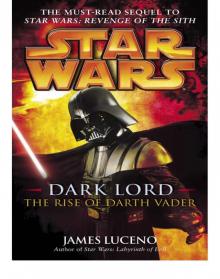 Star Wars: Dark Lord: The Rise of Darth Vader
Star Wars: Dark Lord: The Rise of Darth Vader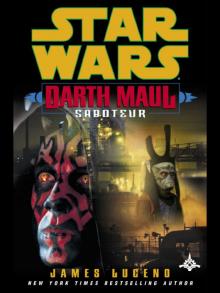 Star Wars Darth Maul: Saboteur
Star Wars Darth Maul: Saboteur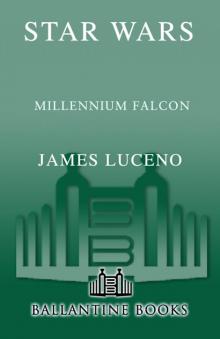 Star Wars: Millennium Falcon
Star Wars: Millennium Falcon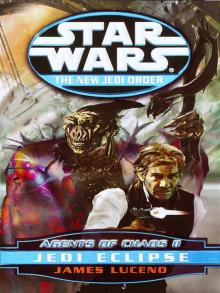 Jedi Eclipse
Jedi Eclipse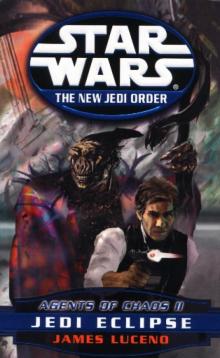 Star Wars The New Jedi Order - Agents of Chaos II - Jedi Eclipse - Book 5
Star Wars The New Jedi Order - Agents of Chaos II - Jedi Eclipse - Book 5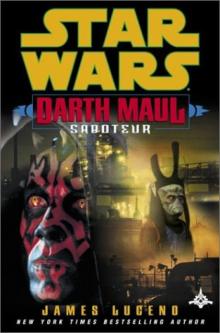 Star Wars - Darth Maul - Saboteur
Star Wars - Darth Maul - Saboteur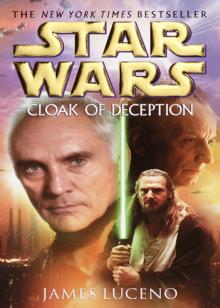 Star Wars: Cloak of Deception
Star Wars: Cloak of Deception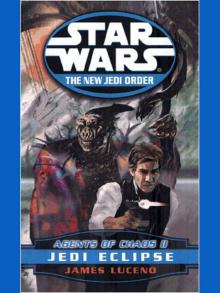 Star Wars: New Jedi Order: Agents of Chaos II: Jedi Eclipse
Star Wars: New Jedi Order: Agents of Chaos II: Jedi Eclipse End Game
End Game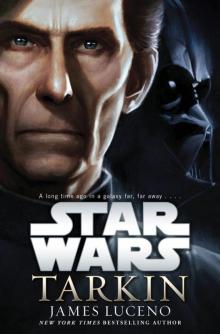 Tarkin: Star Wars
Tarkin: Star Wars Restraint
Restraint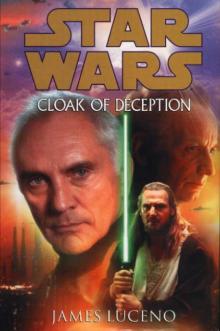 Star Wars - Cloak Of Deception
Star Wars - Cloak Of Deception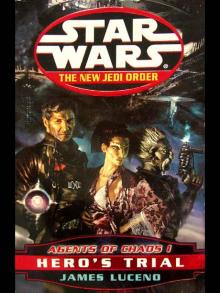 Star Wars: New Jedi Order: Agents of Chaos I: Hero's Trial
Star Wars: New Jedi Order: Agents of Chaos I: Hero's Trial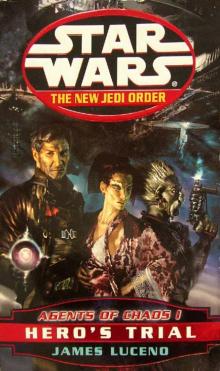 Star Wars The New Jedi Order - Hero's Trial - Book 4
Star Wars The New Jedi Order - Hero's Trial - Book 4 The Essential Novels
The Essential Novels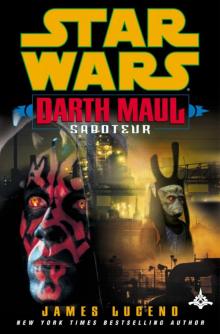 Darth Maul: Saboteur
Darth Maul: Saboteur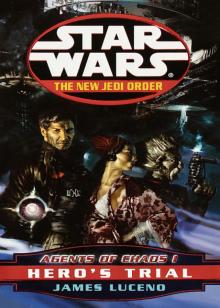 Hero's Trial: Agents of Chaos I
Hero's Trial: Agents of Chaos I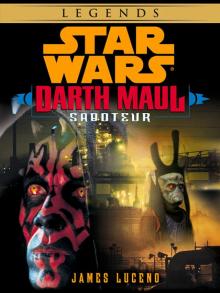 Saboteur
Saboteur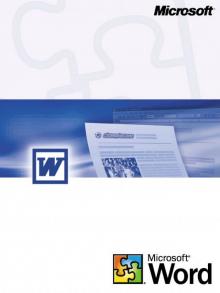 The Unifying Force
The Unifying Force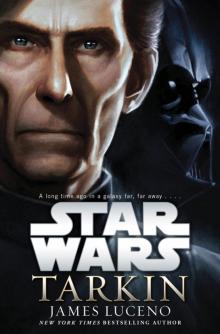 Tarkin
Tarkin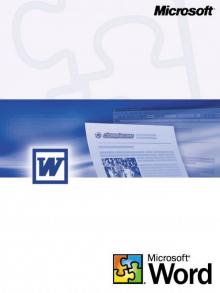 Dark Lord : The Rise of Darth Vader
Dark Lord : The Rise of Darth Vader Catalyst
Catalyst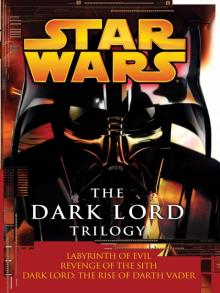 Book 0 - The Dark Lord Trilogy
Book 0 - The Dark Lord Trilogy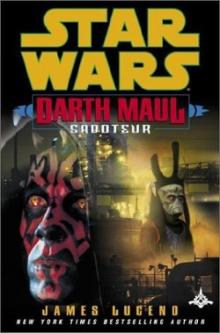 Darth Maul: Saboteur (star wars)
Darth Maul: Saboteur (star wars)